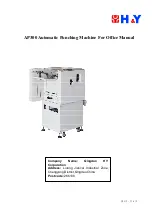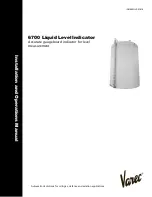
3. SPECiFiCation
tECHniCal data
rated Capacity
Safe Working load (SWl) 1t (tested to 50% overload).
lifting Capacity in Position 1: ..................................... 1000kg
lifting Capacity in Position 2: ....................................... 800kg
lifting Capacity in Position 3: ....................................... 700kg
Model no: ...............................................................SPC1000
3.1.1.
design Capability: Test load 50% overload.
3.1.2.
For a description of in-service and out-of-service conditions see
Section 1 Safety, Section 6 Maintenance.
3.1.3.
The crane is fitted with a bypass valve that will prevent the ram
from over extending.
3.1.4.
For applications see Section 1 Safety.
3.1.5.
For control system, see fig.2 for release valve, pump assembly
and handle. operation is explained in Section 5.
3.1.6.
For ground condition requirements, see Section 1 Safety.
3.1.7.
For information on parts and materials requiring specialised
repair techniques see Section 6 Maintenance.
4. aSSEMbly
4.1. aSSEMbly.
Your crane is delivered assembled but in a folded condition. Before using, it is necessary to lay the folded crane on it’s ‘back’ on the
floor and proceed as follows.
Unpack the product and check contents against the parts list in these instructions. Should there be any damaged or missing parts
contact your supplier immediately. We recommend two people assemble the crane as follows:
a) lower the crane legs and lock them into place with the pins.
b) Rotate the assembled crane onto its wheels. ensure the pins are fully engaged and turn to lock in place.
c) Bleed the Hydraulic System: Place the pump handle into the pump socket, open the release valve and pump handle10-15
times through the full stroke, thus bleeding from the hydraulic system, any air which may have entered during transit.
4.2. StoragE.
a)
Always store the crane fully closed so that the jib is in lowest position and the ram is closed.
b)
To save space the legs may be folded into the upright position and secured in place using the lock Pins.
5. oPEration
5.1.
oPEration. (refer to Section 6.2 (a) regarding inspection before each and every use).
a)
Use the pump handle recess to tighten the release valve, turning firmly clockwise.
note:
The pump can be swivelled through 300° for ease of use.
b)
Place handle into pump socket and pump, the jib will raise. Continue to pump until the jib reaches the height at which the load can be
secured.
c)
Connect the crane hook to the load using a suitable sling or support beam. ensure you are aware of the load weight, and check
that it is within the capacity of the crane (at the jib extension you are using) and the sling or support beam. When removing engines
ensure you know the weight. Use only the lifting points recommended by the vehicle manufacturer.
d)
lift only from directly above the load.
Warning! do not liFt tHE load at an anglE!
e)
To lower load, position handle on release valve at base of ram and turn VeRY SloWlY anti-clockwise avoiding any sudden movement.
Warning! do not
allow the load to drop suddenly.
f)
The crane is not a transportation device but may be used to reposition the load being worked on. To do so, lower load and jib
with care, to the lowest possible point before attempting to move.
do not
try to move crane in a sideways direction. The crane
is not designed to support the load indefinitely. When you have repositioned the load, lower the load onto a secure and
appropriate working base, being fully aware of your own and other persons locations in relation to the lowering load.
g)
When load has been secured, remove lifting sling, support beam etc. and place crane in a safe location with lifting beam fully lowered.
6. MaintEnanCE/inSPECtion
notE:
The crane
MuSt
be kept clean and dry and must be maintained in accordance with these instructions.
6.1.
lubriCation.
a)
oil all working parts monthly.
b)
The ram is filled with oil and should only require occasional topping up. For the occasional top up
do not
use brake fluid, as this will
damage the hydraulic seals. Proceed as follows:
1) Use only good quality hydraulic jack oil available from your Sealey stockist.
2)
do not oVErFill
as this will cause failure.
3) After filling with hydraulic oil, pump the crane up to its full height and pour off any excess oil.
6.2.
inSPECtion and EXaMination oF CranE bEForE uSE.
a)
Before each use of the crane, perform an inspection for leaks, damage, loose or missing parts.
b)
The workshop crane must be examined immediately if it has been subject to an abnormal load or shock. It is recommended that such
an examination is made by an authorised service agent.
c)
The owner and/or operator must be aware that repair of this equipment will require specialised knowledge and facilities. It is
recommended that an annual examination of the workshop crane is made by an authorised service agent.
d)
Unauthorised parts may be dangerous and will invalidate the warranty.
PUMP HAndle ASSY.
ReleASe VAlVe
fig.1
SPC1000 Issue 4 (HF) 02/11/18
Original Language Version
© Jack Sealey limited





















